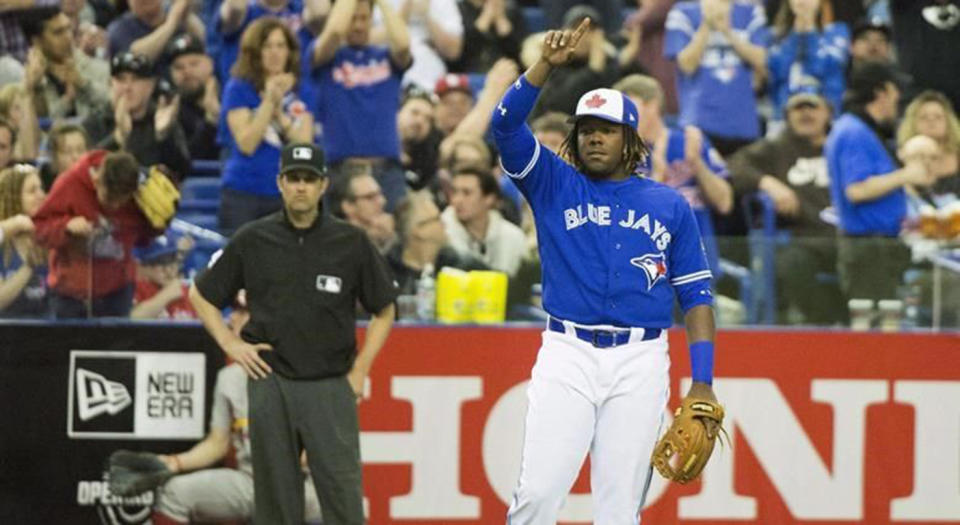Blue Jays are incentivized to keep Vladdy Jr. down, but they don't have to

In recent days, Toronto Blue Jays president Mark Shapiro has seemingly spent most of his time explaining how the club is handling Vladimir Guerrero Jr.
On Wednesday, he went on MLB Network Radio to make the following claim:
“It has nothing to do with business. It has nothing to do with anything other than we think the best thing for him developmentally is to go play in Arizona and continue to develop. We think when he gets here—which would obviously not preclude him from making the team out of spring training next year, which would be evidence of that fact—we think he’s got a chance to be an impact player.”
The statement is somewhere between misleading and a lie depending on where you choose to draw that line. Deciding to keep Guerrero in the minor leagues absolutely has to do with his service time. It’s a matter of how much the team will have to pay him, when, and for how long. The MLBPA didn’t take kindly to what Shapiro said and responded with the following:
“The union’s position on service-time manipulation is clear, Vladimir Guerrero Jr. and other great young talents around baseball have earned the right to play on the field for a major league team.”
Steamer projects that the 19-year-old would be a top-20 hitter in the major leagues right now and any attempt to pretend he wouldn’t be an asset to the Blue Jays today is downright silly. His bat is ready, and although his glove is behind, he would still be a huge upgrade to the club. The reason he isn’t in Toronto this very second is because the Blue Jays don’t want his service time clock to start, especially in the midst of a lost season. If they were pushing for a playoff spot, he would be up.
On Friday, Mark Shapiro spoke to local media in Toronto and offered another explanation for Guerrero’s absence from the big club.
“It’s very difficult to focus on player development at the Major League level. This could be it for his development time.”
The idea that Guerrero won’t learn and develop in the big leagues is hogswash. There’s an argument to be made that’s the best place for him to develop – especially on a team like the Blue Jays that doesn’t have to worry about wins and losses. He’s made a mockery of every other level and he’s not going to learn something new from facing Arizona Fall League pitching. On the defensive side of the ball, it really doesn’t matter where he puts in the work, as long as he puts in enough of it.
So, what we’re seeing is a kabuki theatre performance where the Blue Jays have to justify their actions with the future of their franchise. They can’t explicitly state what they’re doing, but everyone knows what they’re doing.
The thing is that most people agree the Blue Jays’ choice is a smart one. Within the constraints of the system in place, their course is logical. They are being incentivized to severely depress the earning potential of arguably their most important employee and they are letting that incentive rule their decision-making process.
With that in mind, many have chosen to blame the system for the way Guerrero’s case has been treated. The Blue Jays’ hands are tied. They are trying to keep their phenom longer given the tools at their disposal. From a competitive standpoint, it would be foolish not to. Here’s what a MLB general manager told Yahoo Sports’ Jeff Passan on the topic of service time manipulation:
“I hate doing it. But if I didn’t, I wouldn’t be doing my job.”
It shouldn’t ever be anyone’s job to suppress your employees’ ability to earn a living and using every possible loophole to reduce payroll. Is there a significant financial incentive for the Blue Jays’ to keep Guerrero from reaching free agency as long as possible? Absolutely. Does that mean they have to do it? No.
The Blue Jays have the option to rise above what’s expected of them and do right by Guerrero. There’s even an argument to be made for it beyond just ethics – which admittedly doesn’t tend to be the strong suit of publicly-traded corporations. If the Blue Jays called up Vladdy Jr. today they would see a massive jump in TV ratings, sell an enormous amount of jerseys, and increase attendance for the final few home games.
Perhaps more importantly, the club could score big points with players and agents, who would undoubtedly notice their unwillingness to play the service time manipulation game. The next major international blue chipper – in the Guerrero mold – would certainly be more inclined to sign with a team where he knew he’d make the majors the moment his performance warranted. That benefit is very difficult to measure, but it could be significant. More significant than an extra year of Guerrero? It’s hard to say, but it could be, especially since the Blue Jays have the option to just extend their stud as free agency approaches.
There’s no doubt the Blue Jays are holding Guerrero down, not because he’s not good enough yet, but rather because it benefits them financially – and they can. Any other explanation they’ve offered to date deflects from the core of the matter. There is an enormous difference between can and have to, though.
For those who believe that baseball teams should do everything possible to keep their payrolls low and increase their competitiveness, there’s nothing to see here. The Blue Jays are just pursuing a championship with the most logical strategy available.
Let’s just make sure we don’t pretend for one second they have no other choice.
More Blue Jays coverage from Yahoo Canada Sports:

 Yahoo Sports
Yahoo Sports 

